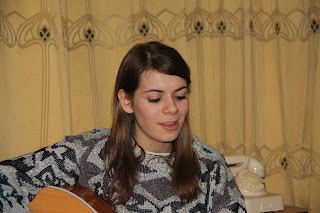I was recently
looking through the music listings for my area and I came across Louise Jordan young singer who is playing Bridgwater Arts Centre on the 9.2.13. I was intrigued by her
selection of music, the interesting way in which she has blended music and
literature, and her own finely wrought songs. I checked out emusic, where I
have had a subscription since Turing was a lad and downloaded a couple of her
albums.
I was impressed.
She had covered one of my favourite traditional songs William Taylor, a tale of
a jilted bride left at the altar, sea battles and retribution. They don’t write
them like that anymore. But I digress.
I here’s Louise:
How did your experience of working in education
inform your perspective of writing and playing music?
Working with a
classroom full of children is great for developing communication skills and
learning audience awareness –thirty plus children aged 11-16yrs can be a fairly
unforgiving audience when you don’t quite pitch it right! Understanding what
makes people tick is crucial to making my song writing relevant and as a
teacher /mentor /youth worker I have taken a great interest in how we question
and challenge what’s in front of us: children are mostly too honest to hide
their true feelings.
What influences you?
Everything. Every
life experience –not just mine but other people’s.
How do you choose the traditional songs you
sing. Do you have a criteria?
I really enjoy
story songs and songs which pose questions. William Taylor, which is on my
first album ‘Tempvs’ is a fantastic example of both. And then there are songs
which endure because they describe a common human experience, like the Salley
Gardens which I have been performing for years. A strength of the oral
tradition on which folk music relies –songs being passed from person to person
– is that songs become crafted and improved over time so that they reflect
human nature.
In your own compositions, which comes first the
words or the music?
Most often I start
with a musical idea which I cannot express in words –a mood, a feeling or an
atmosphere which I want to capture. The words help to make this idea clearer.
You have your own record label, how important is
artistic control for you?
Very! Both the
recording and the arranging processes are crucial to the development of each
composition and I have deliberately set about writing and arranging my own
work. It also really helps set the pace of recording as I am self-reliant -so
if I want to work through the night I can.
Looking back what would you have done
differently?
I try not to have
regrets. Having said that on, a professional basis, more honesty would have
helped me access song writing ideas earlier on in life. But then there’s a
reason it took me some time to get to where I am now.
The title of your latest CD is Florilegium,
which I am led to believe means a collection of short literary pieces, poems
and ballads, how did you arrive at that as a title?
The word originally
means a gathering of flowers. On the album, each piece has its own beauty and
they come together as a bouquet or tapestry. The songs on the album are very
individual and yet they fit together as they describe a variety of experiences
in life.
Who is your favourite poet?
I don’t have a
favourite poet, just favourite pieces. I have enjoyed setting literature –in
particular poetry –to music and have done this from a young age. I used to go
to a wonderful theatre group for 13-21 yr olds in my home town of Salisbury and
this really encouraged creativity. We frequently worked with literature and
used music in a less conventional way. I can trace my musical arrangements of
Christina Rossetti’s ‘Promises Like Pie-crust’ (on my second album Florilegium)
and Thomas Hardy’s ‘Without Ceremony’ to these early experiences.
If you were a colour what colour would you be
and why?
White is a
culmination of all the colours and I am an accumulation of my many life
experiences.
Thanks Louise. She
is definitely worth catching live if you get the chance.





















